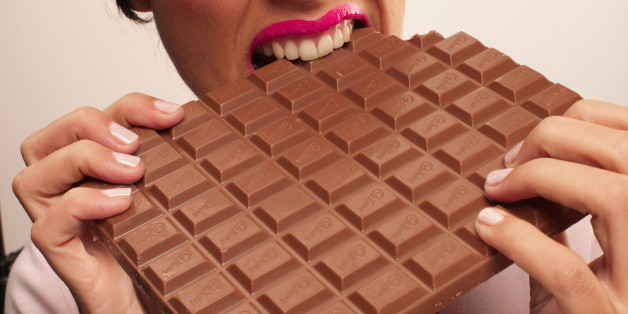Hunger VS Craving
The question is, is it a craving, or am I really hungry? We first need to understand the difference between a physical food craving—or actual hunger—and an emotional food craving. Cravings can be caused by either physical or psychological needs. Emotional cravings or eating triggers are usually caused by psychological needs, while hunger is a biological function of the body's real need for food. Emotional cravings can lead to bingeing. Learn to listen to your body and know what it is trying to tell you.
Hunger: Your Need for FoodBy definition, hunger is "the painful sensation or state of weakness caused by the need of food." Simply put, hunger is a signal from your body that it needs food for energy. When you’re truly hungry, your stomach, brain, or both will give you cues to tell you to eat. Signals from your stomach may be growling, an empty, hollow feeling, or hunger pangs. Your brain may send signals such as a headache, trouble concentrating, irritability or fogginess. Some people even experience physical fatigue when they are hungry. Hunger does not go away over time—it only gets worse. And any food will satisfy your hunger and take the hunger signals away.
Craving: "Food cravings arise to satisfy emotional needs, such as calming stress and reducing anxiety".A food craving is an intense desire to consume a specific food, stronger than simply normal hunger. In studies of food cravings, chocolate and chocolate confectioneries almost always top the list of foods people say they crave;this craving is referred to aschocoholism.
FOOD ADDICTION

Food addiction can be ruthless and sometimes it feels impossible to be able to stop cravings. Fortunately, there are several mental tricks you can use to stave off the
unnecessary hunger that can slow you down and put on the pounds.
unnecessary hunger that can slow you down and put on the pounds.
HELPFUL TIPS
1. Distraction
Food cravings are often associated with boredom. If there is nothing to do, eating is a way to kill time and satiate any emotions that may arise when we over think. Check yourself before you grab a high-fat, high-calorie treat, and start moving instead. Get out of the house and walk, jog, garden or drive somewhere (preferably where there isn't a food court or the like). Simply creating momentum will distract your mind from food. Meet or call a friend, or do anything that will change your focus.
2. Disappear
If there is food around and people are eating, get away. Removing yourself from family or friends during their food consumption will get you out of harms way. Initially this may mean not being able to enjoy snacks with friends or family but in the long run when you have your cravings under control, you will be able moderately join in.
3. Repeat Your Mantra

Mental conditioning is difficult, but it works. Creating a mantra that you can repeat to yourself during times of temptation will eventually sink in and empower you. One well known mantra is:
"A minute on the lips, a lifetime on the hips."
4. HALT

5. Water
Water is a great way to trick the brain into thinking you ate. When a food craving arises reach for an ice cold glass of water. The cold will stimulate your metabolism to warm the water to body temperature and in turn help burn calories as well as give you a nice energy boost. Adding fruit wedges, such as lemon, lime or orange can also help satiate the craving for something with taste.
Water is a great way to trick the brain into thinking you ate. When a food craving arises reach for an ice cold glass of water. The cold will stimulate your metabolism to warm the water to body temperature and in turn help burn calories as well as give you a nice energy boost. Adding fruit wedges, such as lemon, lime or orange can also help satiate the craving for something with taste.
6. Brush
Brushing your teeth tricks the brain into thinking something sweet has been ingested. Carry a travel toothbrush and toothpaste with you at all times. When a craving arises go to the rest room and brush. You'll stave the hunger, have clean teeth and minty fresh breath.
7. Use a Stopwatch
Fortunately, a craving only lasts between five and 20 minutes. Having a stopwatch available during a craving is an excellent way to gauge how long your craving is. When a craving arises, hit your stopwatch, drink a glass of cold water and wait. Keeping an eye on the clock will distract your craving.
EMOTIONAL EATING... Can sabotage your weight loss goals!!!
Can't
stop snacking at work? It's an easy enough habit to fall into, but a really
devilish one to stop. Snacking at work can often be a sign of boredom, stress,
overload, and lack of sleep,
so finding a cause as well as finding healthy
substitutions is important.
Get
to the bottom of why you feel compelled to snack at work. Sometimes, not liking
your job or your assignments results in spending your time doing something
else, and snacking is often a simple option. Reasons for snacking at work might
include:
·
Avoidance of work
·
Overloaded with tasks
·
Hunger
·
Thirst
·
Boredom, to occupy yourself
·
Tiredness, to get energy
·
Stress, to relax
·
Tackle the cause.
Think
about the ways in which you can improve the challenge facing you.
Some
things you can do include:
·
Eat a larger breakfast: make more sustaining energy food choices;
·
Choose healthy snacks: over sweet and salty snacks (e.g., celery and
carrot sticks, sunflower seeds)
·
Get more sleep
·
Go to bed earlier
·
Create a procrastination attacker's plan. To get yourself over the
humps of work you'd rather avoid, break it down into smaller chunks and tackle
in smaller lots. Reward yourself with breaks rather than snacks.
·
Drink water, tea, coffee, in place of snacks.
·
Lock the snacks cabinet/cupboard!
·
Go outside for a break. Sometimes exercise will be a better answer
than food at work.
·
Instead of spending 10 minutes snacking, do 10 minutes brisk
walking, even in cold weather. It'll wake you up.
·
Use chewing gum to help with boredom, hunger and stress.
·
Stay busy: you tend to eat treats if you're bored. If you're able
to keep yourself hectic you may not even think about snacks. Responsibilities
to complete may help keep the mind off lovely goodies.






No comments:
Post a Comment